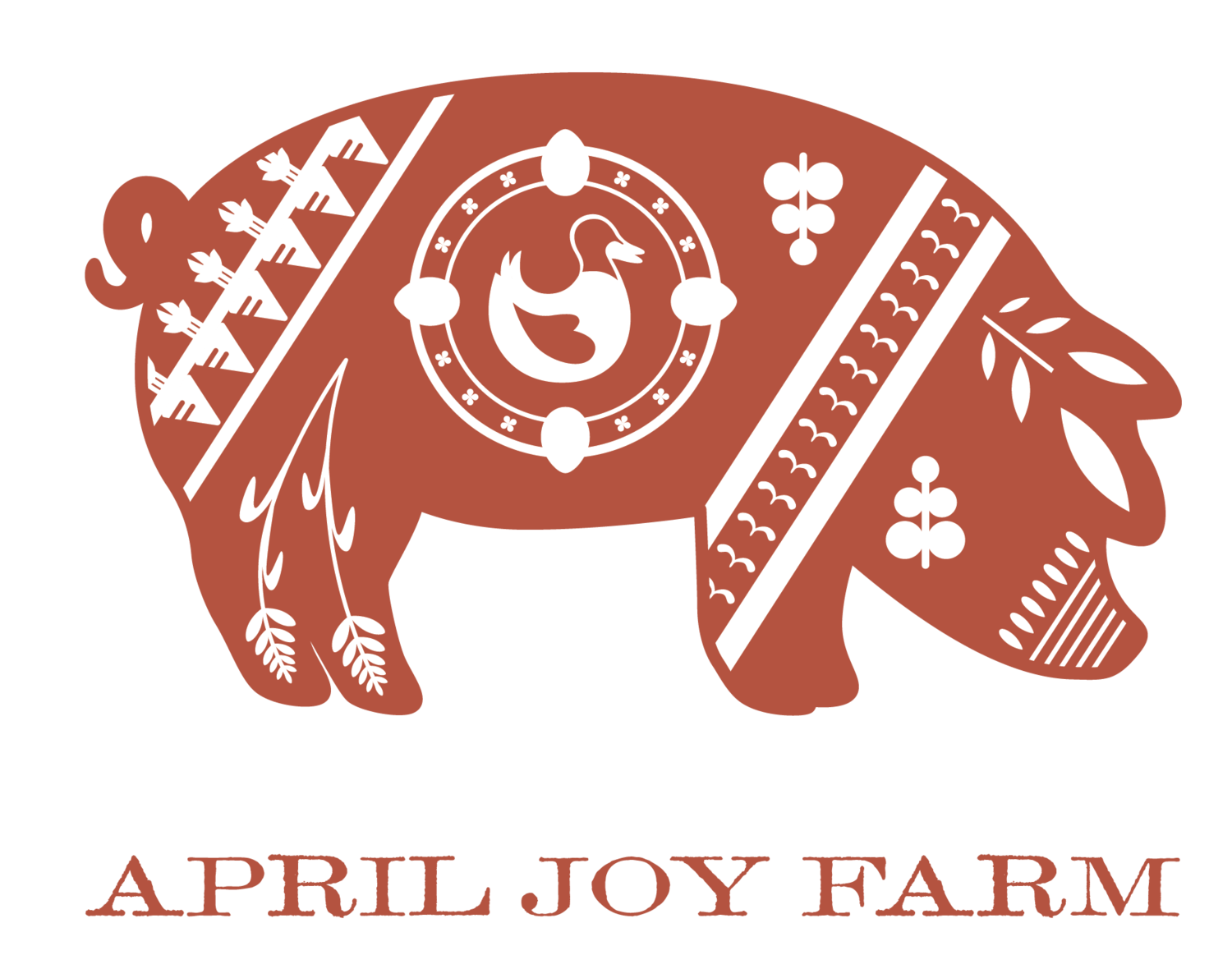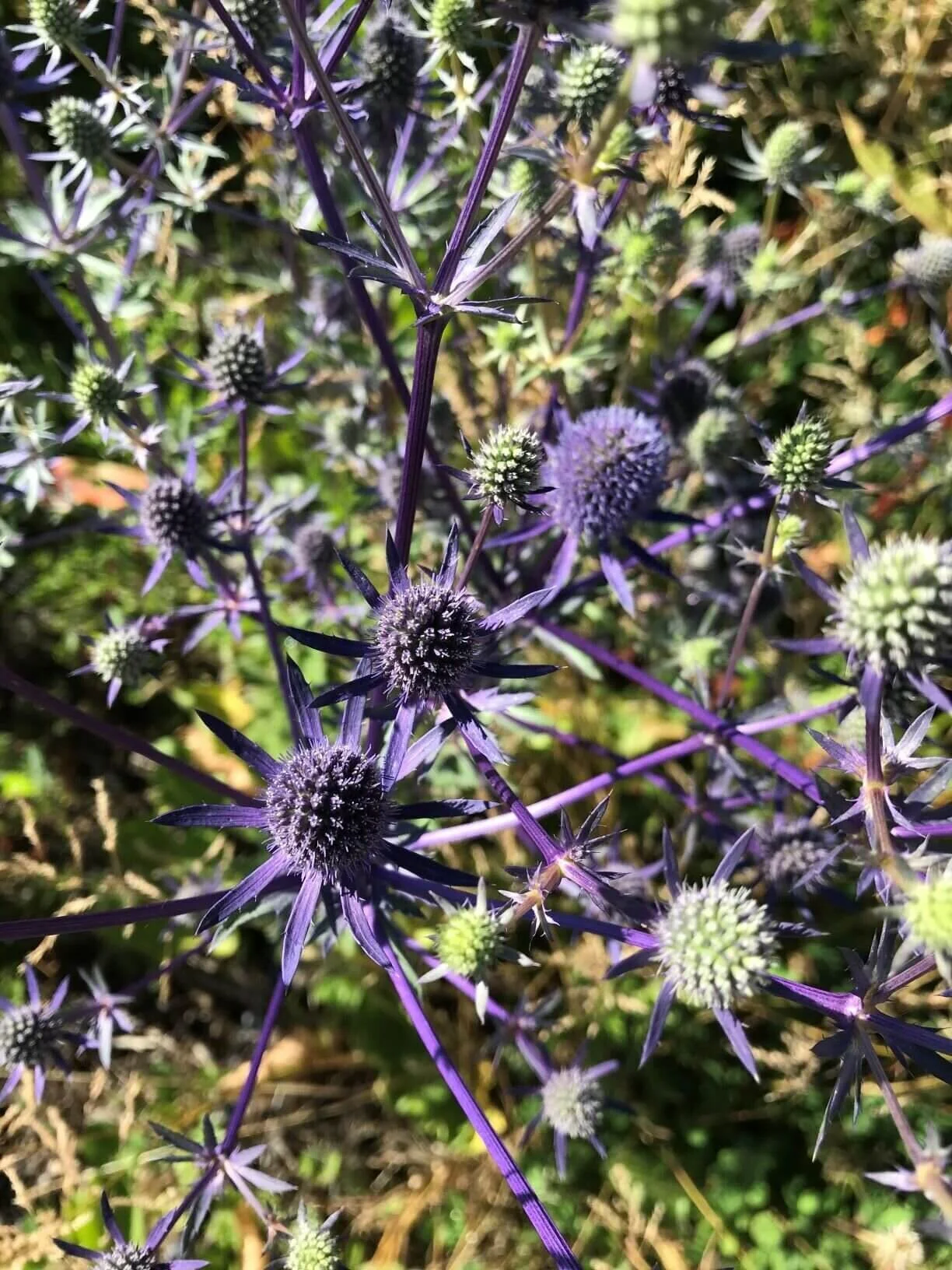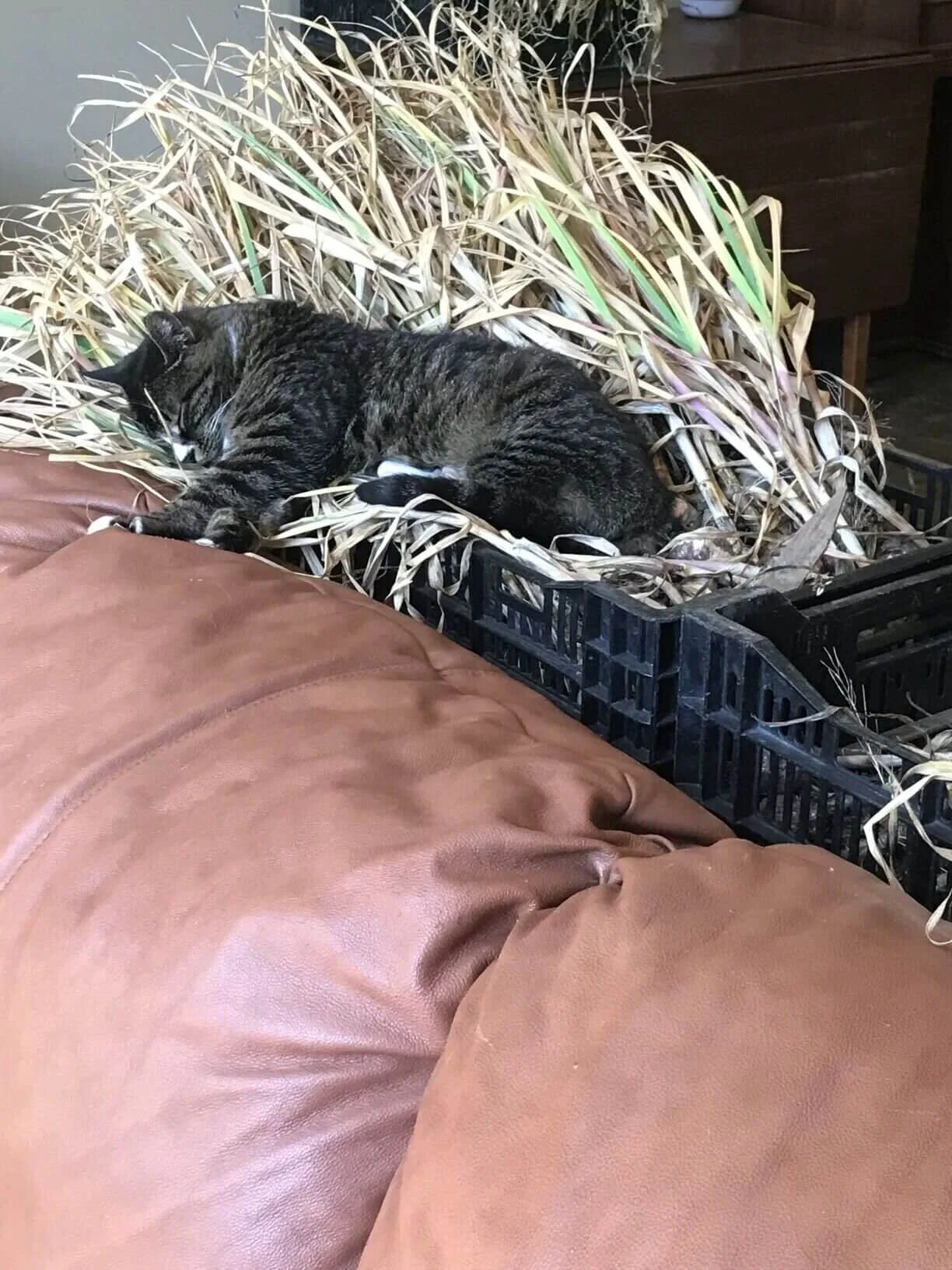Nourishing Bites | Weathering
Eryngium planum 'Blue Glitter' | A beautiful spiny intensely colored flower that graces our field. Also called Sea Holly, this plant may look thistle-y but it’s actually a member of the carrot family. Eryngium planum is a perennial with a deep taproot that can survive draughty conditions. We introduced it to our fields for its superstar pollinator power.
Weathering
Family, very little time was given to this week’s essay. I ask that you forgive any missteps/mistakes contained within. It was written stream of conscious and has not been edited. However imperfect, I trust the sharing matters most. Some of you have reached out and expressed concern for the farm and our well being over the last week… thank you all for your kindness.
It took me 15 hours to realize the filter needed cleaning. That was why the valve when turned open was silent, that was why the water did not rush into the lines with a shushing expansiveness I’d grown accustomed to. In any given moment, I could have diagnosed this in 15 seconds flat. After all, with Dad’s mentorship, it was I that built this. It was my hands that dug the hole for that valve box, my hands that laid out the components and their proper order - main valve, tee, spigot, filter, tee, elbows, pressure reducers, section valves... it was my hands that held the operator's manual when I taught myself the maintenance steps.
On Sunday, it was I that needed 15 hours to realize the filter was clogged.
***
There are so many doorways into the story of this past week. Under stress, the mind retreats to a small place and leaves a void where data, memory, knowledge, efficiency once lived. Things that were common, things I did from rote memory, things I absorbed and processed without effort for a decade, are now, like our chickens seeking relief from the heat, untethered from the confines of a fence and dispersed across the edges of the field in pockets of underbrush and shady moss.
I have to let go of the anxiety, the instinct to fight and clasp and grasp tightly to what once was, to worry over what is wrong, what is not right, what is not as it used to be, what might remain. I have no energy to explain, to fuss, to relive, or to complain. I have no time to grieve, to answer the question, “Is the farm okay?” What was heretofore assumed, taken for granted as solid and stable, expected, no longer is.
What actually is?
The movement of one task to the next, and the next and the next, done with as much compassion for my missteps as I can muster.
***
It was Brad, of course, who understood the flock dynamics and decoded the situation. Even in the 106 F heat, Pillsbury, our giant Plymouth Rock rooster would not come inside the barn. He is low on the pecking order and has adapted to spending his days out in the big field, away from any potential conflict. But now in this heat, he was languishing from his deep instinct for self preservation.
We took him water at first, there where he panted under the shade of a small fruit tree. But by the second day of double digits, it was clear this would not end well.
Farmers often face several not-great alternatives when it comes to livestock decisions such as this. Removing an animal from the group and placing them in isolation is not typically ideal. But physical safety often overrides all else. And what is practical to accomplish given time, infrastructure and other such constraints, further winnows the options. Luckily, we weren’t dealing with a 1500 lb animal. So we carried Pillsbury out of the heat, cooled him down with water, and released him into the back yard where his new flock members consisted of four goats. Then we went back to attending to the list of more pressing work. And we hoped for the best.
These kinds of situations always present more challenges, more decisions, more risks to be accepted. Pillsbury has a rare personality and excellent genetics we definitely want in our flock. Losing him would be a significant setback. Would they fight? Would he escape? Where would he sleep and how would we find him? Would he end up in an irretrievable corner that night and be at risk for predation by coyote? We could not concern ourselves with these possibilities.
We could not solve or fix or predict given the mountain of other priorities needing solved and fixed and predicted.
We had to trust that when night fell, we could solve or fix or address what actually happened, not the twenty possibilities that could happen. There were too many other things actually happening right now.
***
Farming will eat you alive if you don’t find a way to make peace with loss. How you do this is up to you.
There is no paint by numbers template, no tried and true method, no universal path to acceptance. There are only the facts and what you choose to do with them.
Loss is part of the family- kin to us all- and to the cycle of life.
Loss is the release of energy- the transformation from one form of being and doing into another.
Loss is language that needs no translation.
Over time, loss paints gratitude in vivid colors.
Losing and loving: two footsteps on the same risky path.
***
With an odd sense of normalcy, hours ago, Brad and I seeded flats per our usual weekly schedule - just as we’ve done every Monday since March. But this time, we were in the basement of the house, where the rest of our youngest, tenderest seedlings also wait out the heat.
And thus, once again, I find myself in the Farmer’s Paradox: this record shattering heat is rising all around me, threatening all we have nurtured and tended. And still, I go on, defiantly, sitting on the basement steps, with flat after flat on my lap, seeding lettuce and broccoli and cauliflower, without any doubt that amidst the saturating fear of loss, this work is exactly the right thing to be doing.
Now, as I write this, I am in the living room. It’s 85F inside the house. Curing garlic that would ordinarily be in the drying shed is stacked in crates all around me to avoid cooking in the heat. Steps away, all our fall transplants have been moved to the shady back porch, where they are growing lanky and hungry for light.
We’ve spent hours moving plants so they would be protected from the onslaught. But now nothing is set up for proper caretaking. Hoses need moved, and buckets. Now we are in a make-shift-shelter-in-place reality.
Every minute I give thanks for water, for electricity, for shade. Every two hours Brad or I go outside to manage irrigation sets, check on livestock, to do what discrete tasks must be done, to tell our farm we love her and to be strong, to hold on.
Sometimes things take a little bit more than I think I might have to give.
I keep my head bowed to the Earth. I give anyway. I keep seeding for tomorrow.
***
Brad and I are doing everything we can to steady the ship in this monstrous weight of heat. By the time you read this, the heat may have subsided, but we know enough to understand this is not over. It is only June. This is not the end of the challenges, but only the beginning.
What is the damage? Some things may be immediately obvious- sunburn, plant death.
Many effects will not be known or felt for weeks or months. Delayed transplanting means stunted plants that have to work twice as hard to find their bearings. Blossoms dropped off tomatoes and cucumbers and beans and pepper and squash now could mean scant July and August harvests.
Not only have our plants endured heat stresses beyond any reasonable expectations, but we have also lost days of work in the fields that are not easily recoverable. Weed pressure has not been managed. Plants have not been staked or trellised or mulched. Spring beds have not been turned over and cover cropped. This story is not over. The book will be written across the weeks to come. There will be no avoiding it. We will all read it together, page by page.
Regardless of the challenges we face, I know with all certainty, we are blessed. My heart goes out to all the farmers in our midst who have faced everything we have, but with the added fear of bankruptcy, of foreclosure, of dry wells and dry bank accounts, of physical and mental injury, of crippling shame for failure they erroneously carry as theirs alone.
Brad and I continue to keep getting up and doing all we can do to honor our commitments to the plants, the animals, and to you. Of course we are tired, and weathered too, but we have much to be grateful for. We know not what the weeks will bring, but we know your support is an essential part of our survival.
***
And what of Pillsbury?
To the west of the farmhouse tucked near the forest edge is a newly constructed shed built to keep the goats safe from predators at night.
Late that night, Brad went to look for our gentle white rooster. His flashlight searched the corners of the shed and there, in the shadows under the wooden platform, with the goats nestled around, was our special feathered guy. Taken from all he had known, set in the middle of a strange place with none of his kind, in the middle of a pressing, unescapable heat, he made peace with loss. He did not fuss, or fight, or lament, or worry. All on his own, Pillsbury walked right into this new life, this new place and made himself right at home.
At a time when our moorings feel adrift, this small offering is a blessing seemingly from beyond- one that buoys our spirits and reminds us that yes, the good is still here, all around us.
Courage and hope persist. ~AJ
Bed Fit For A Queen / When Even The Couch Is Too Hot | Mabel sleeps in the temporary garlic drying shed (aka our living room).


